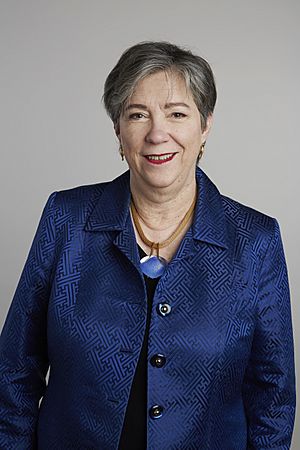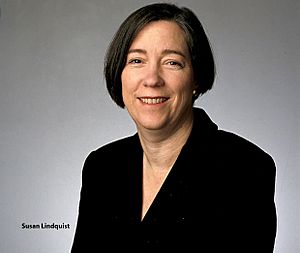Susan Lindquist facts for kids
Quick facts for kids
Susan Lindquist
|
|
|---|---|

Susan Lindquist in 2015, portrait via the Royal Society
|
|
| Born |
Susan Lee Lindquist
June 5, 1949 Chicago, Illinois, U.S.
|
| Died | October 27, 2016 (aged 67) Boston, Massachusetts, U.S.
|
| Nationality | American |
| Alma mater | |
| Known for | protein folding heat-shock proteins prions |
| Awards |
|
| Scientific career | |
| Fields | Molecular biology |
| Institutions |
|
| Thesis | Protein and RNA synthesis induced by heat treatment in Drosophila melanogaster tissue culture cells (1976) |
| Doctoral advisor | Matthew Meselson |
Susan Lee Lindquist (June 5, 1949 – October 27, 2016) was an American professor and scientist. She worked at MIT and was an expert in molecular biology. Her main research focused on how proteins fold correctly inside cells. She also studied special proteins called heat-shock proteins and mysterious particles called prions. Lindquist was a member and former director of the Whitehead Institute. She received the National Medal of Science in 2010, which is one of the highest science awards in the U.S.
Contents
Early Life and Education
Susan Lindquist was born in Chicago, Illinois. Her parents were Iver and Eleanor. She went to Maine South High School in Park Ridge.
Susan's parents had hoped she would become a housewife. However, she chose a different path. She studied microbiology at the University of Illinois. Later, she earned her PhD in biology from Harvard University in 1976. After that, she continued her research with a special fellowship from the American Cancer Society.
A Career in Science
After finishing her PhD in 1976, Lindquist joined the University of Chicago. She became a faculty member in the Biology Department in 1978. There, she began to study heat shock proteins. These proteins help cells respond to stress from the environment.
Lindquist was a pioneer in using yeast as a model. She used yeast to understand how heat shock proteins control how genes work and how proteins fold. Because of her important work, she became an investigator for the Howard Hughes Medical Institute in 1988.
Discoveries with Prions
Lindquist made big discoveries about prions. Prions are unusual proteins that can cause diseases. In 2001, she moved to MIT. She became the Director of the Whitehead Institute for Biomedical Research. She was one of the first women to lead such a major research organization.
After her time as director, Lindquist returned to research in 2004. She continued her work at the Whitehead Institute. She also joined the Broad Institute and the David H. Koch Institute for Integrative Cancer Research at MIT.
National Recognition
In 2010, Susan Lindquist received the National Medal of Science. This award recognized her important research on protein folding. She also gave many talks about science around the world. She even participated in the World Economic Forum in Switzerland in 2007.
Lindquist also helped start two companies. These companies, FoldRx and Yumanity Therapeutics, aimed to turn her research into new medicines. They worked on treatments for diseases caused by misfolded proteins.
In 2016, a $5 million gift was given to the Whitehead Institute. This gift created the Susan Lindquist Chair for Women in Science. It honors her memory and supports female scientists at the institute.
Understanding Protein Folding
Lindquist is famous for her research on genetics. She showed that some traits can be passed down through proteins. This is different from the usual way traits are passed through DNA sequences. Her work helped us understand serious brain illnesses. These include Alzheimer's, Parkinson's, Huntington's, and Creutzfeldt–Jakob disease.
She explained that protein folding is a very old and important problem in biology. She said:
What do "mad cows", people with neurodegenerative diseases, and an unusual type of inheritance in yeast have in common? They are all experiencing the consequences of misfolded proteins. ... In humans the consequences can be deadly, leading to such devastating illnesses as Alzheimer's Disease. In one case, the misfolded protein is not only deadly to the unfortunate individual in which it has appeared, but it can apparently be passed from one individual to another under special circumstances – producing infectious neurodegenerative diseases such as mad-cow disease in cattle and Creutzfeldt–Jacob Disease in humans.
Lindquist studied a special element in yeast called PSI+. This element is a type of prion. She found that it can act like a switch. It can hide or show many mutations in the genome. This means it can help living things adapt and evolve. She also thought that a heat shock protein called hsp90 might work in a similar way. It usually prevents genetic changes from showing up. But if the HSP system is overloaded, all changes might appear at once.
Most of these changes might be harmful. However, some rare combinations could create useful new traits. This could speed up how living things evolve. Cancer cells also have a strong ability to evolve. Lindquist's lab studied how these evolutionary processes are involved in cancer and in fungi that become resistant to medicines.
Lindquist also made progress in nanotechnology. She researched tiny organic fibers called amyloid fibers. These fibers can organize themselves into structures smaller than human-made materials. Her team also created a "living test tube" model using yeast. This model helped them study protein folding in brain diseases. It also helped them test new ways to treat these diseases.
Awards and Honors
Susan Lindquist received many awards and honors for her scientific work:
- Elected to the American Academy of Arts and Sciences in 1996.
- Elected to the National Academy of Sciences in 1997.
- Named a fellow of the American Academy of Microbiology in 1997.
- Received the Novartis/Drew Award in Biomedical Research in 2000.
- Received the Dickson Prize in Medicine in 2003.
- Elected to the American Philosophical Society in 2003.
- Named one of the 50 most important women in science by Discover Magazine in 2002.
- Awarded the Sigma Xi William Procter Prize for Scientific Achievement in 2006.
- Elected to the Institute of Medicine of the National Academies in 2006.
- Awarded the Genetics Society of America Medal in 2008.
- Awarded the Otto Warburg Medal by the German Society for Biochemistry and Molecular Biology in 2008.
- Awarded the FASEB Excellence in Science Award in 2009.
- Awarded the Max Delbrück Medal, Berlin, Germany, in 2010.
- Awarded the Mendel Medal by The Genetics Society, UK, in 2010.
- Awarded the National Medal of Science (for 2009) in 2010.
- Made an Associate Member of the European Molecular Biology Organization in 2011.
- Awarded the E.B. Wilson Medal by The American Society for Cell Biology in 2012.
- Awarded the Vanderbilt University School of Medicine Vanderbilt Prize for Women's Excellence in Science and Mentorship in 2014.
- Elected a Foreign Member of the Royal Society (ForMemRS) in 2015.
- Vallee Visiting Professorship (2015)
- Awarded the Albany Medical Center Prize in Medicine and Biomedical Research with F. Ulrich Hartl and Arthur Horwich in 2016.
- Awarded (posthumously) the Rosenstiel Award in 2016.
Personal Life
Susan Lindquist was married to Edward Buckbee. They had two daughters. She passed away from cancer in Boston on October 27, 2016, at the age of 67.
 | Ernest Everett Just |
 | Mary Jackson |
 | Emmett Chappelle |
 | Marie Maynard Daly |


